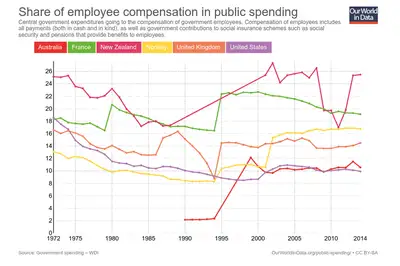
How much of government spending should go to paying the salaries of public servants?
By Dr Mark Avis
As we head into our general election, there is an undiscussed issue that will have an impact on the policies of all the major parties: public sector compensation.
I recently came across an interesting dataset. It showed the share of employee compensation within public spending – that is, how much of government spending goes to paying the salaries of public servants. I compared how New Zealand ranked against other countries, and was somewhat surprised at the results.
The chart below compares the results of New Zealand to a range of OECD countries and the compensation of New Zealand government employees is strikingly high. The figures come from ‘Our World in Data’ from economists at University of Oxford and I contacted them to ask if they were aware of any reason why the New Zealand government has such high compensation as a percentage of GDP, or if there were data comparability problems.
Although the data in their site is not always comparable, for example with difficulties over spending across different government levels, they did not identify any particular problems with this data – and the OECD countries I highlight as examples generally have better data.

New Zealand sits at the top of this graph that shows the share of public spending that goes on salaries.
Election time is a good time to ask questions
Public expenditure is always a major election issue, with each of the political parties laying out their plans and justifications for how the budget should be divided and spent. If, as the data suggests, employee compensation is disproportionately high in New Zealand, this must come at an opportunity cost.
When employee compensation is running at one-quarter of public spending (compared to 10.5 per cent in Australia, for example), it certainly raises questions. It amounts to a very sizeable difference in budget structure in relation to other developed countries and is therefore a very significant budget policy choice.
The Our World in Data website allows you to examine the data from any combinations of countries. In doing so, it quickly becomes apparent that New Zealand’s government wage bill makes it an outlier when compared to most developed countries. There is no obvious explanation for why this might be the case, or why there was an upward spike in the percentage of public spending devoted to compensation around 2011-14.
It occurred to me that there might be a benefit from high compensation – after all New Zealand is ranked as one of the least corrupt countries in the world. But Norway is even less corrupt, despite a lower percentage going to employee compensation, and there are other countries with excellent rankings but with far lower employee compensation percentages.
Of course, the data is derived from a single chart that may ignore particularities or peculiarities of the context here in New Zealand. But it seems the question of why New Zealand spends so much on government employee salaries deserves an answer – and surely now is the appropriate time to be asking. I would certainly be interested to hear the political parties weigh in.
Dr Mark Avis is a senior lecturer at the Massey Business School
Data Source: https://ourworldindata.org/public-spending/#recent-data-on-the-size-of-governments